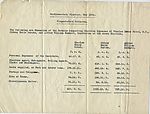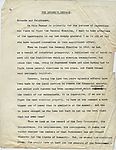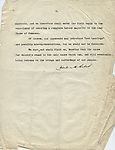 Parliamentary Candidates' Expenses 1929
Parliamentary Candidates' Expenses 1929 Charles Sitch's message to supporters
Charles Sitch's message to supporters Page 2 of the message
Page 2 of the message Labour Party Policy 1928
Labour Party Policy 1928 Summary of Policy p.52
Summary of Policy p.52 Summary p.53
Summary p.53 Summary p.54
Summary p.54 Summary p.55
Summary p.55

Charles' success as a trade union organiser provided the foundation for his political career. Nominated by the Chainmakers' and Strikers' Association, he was elected as Labour M.P. for Kingswinford in 1918. He fought five further general elections, only losing his seat in Labour's landslide defeat in 1931. He was appointed Justice of the Peace in 1930. He was a Freemason, belonging to The New Welcome Lodge, the stated aim of which was to make freemasonry more accessible to the working classes.
The first image you can see shows the amount of money each candidate spent on their 1929 election campaign. Charles was the sitting M.P. at that time. Sidney Garcke stood for the Conservatives and Alfred Bowkett for the Liberals. The difference in how much each candidate spent is quite striking. Despite spending the least, Charles once again retained his seat.
You can also see a copy of a letter that Charles sent to his supporters before the 1929 election. Funds were clearly low. A fund raising Bazaar gave him the opportunity to thank them for past efforts, and urge them on to greater ones.
We have included some pages from "Labour and the Nation", a document which set out the Labour Party's policy and programme before the 1929 election. The main aim was to transform Capitalism into Socialism. The summary lists the measures a Labour Government would take to achieve this.
Charles had first entered politics in 1913 as a Liberal Councillor for Cradley Heath. He left the Liberals in 1916. In 1918 he was one of 63 Labour M.P.s elected, four of them from the Black Country. It seems that funds were limited then, too. "Despite very limited funds and an almost non-existent organisation, in a constituency about 8 miles wide, the party did not have a single vehicle at its disposal and Sitch frequently had to walk from and to meetings, an overwhelming personal vote in the chainmaking districts of Old Hill and Cradley Heath brought a majority of 2,888, and maintained him in office until the landslide of 1931." (The Dictionary of Labour Biography, Bellamy and Saville)
Charles did not make a great impact as a parliamentarian, but he was an excellent constituency M.P. He was well respected by local people of all political persuasions.
Rollover the captions in the box to see the available images in thumbnail format, click the caption to see the full-size image
| Reference: | 655 |
| Keywords: | |
| Archive Ref: | 2007/001/0044 |
| Updated: | Tue 27 Feb 2007 - 0 |
| Interpretation written by | Barbara Harris |
| Author's organisation | |
| Organisation's website |